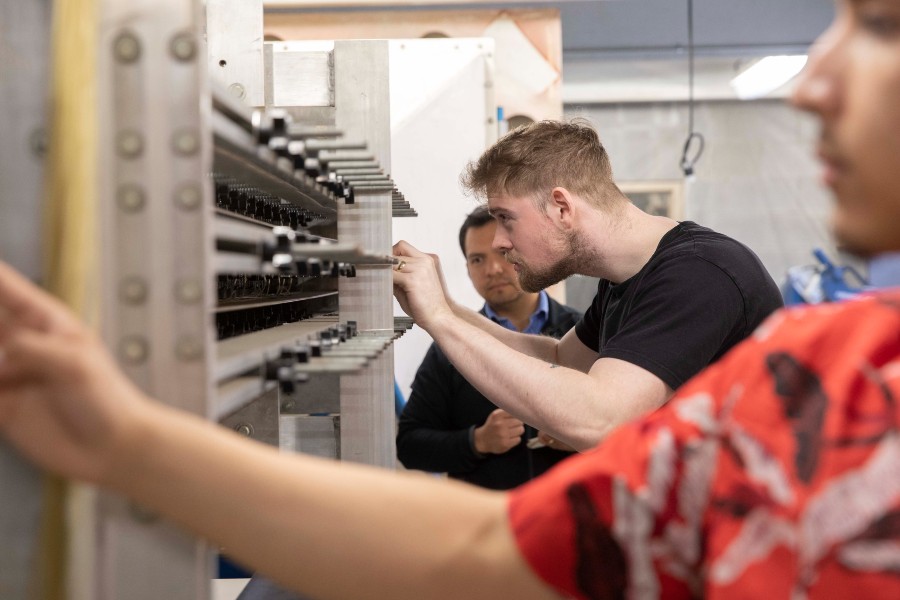Engineering faculty and alumnus awarded 2023 summer research grant
David Collao, assistant professor, awarded institutional grant to advance use of engineering college’s wind tunnel.
Janel Shoun-Smith |

Max David Collao overseeing engineering students working with the engineering college's wind tunnel.
Each year, Lipscomb University awards up to six grants to allow faculty to focus on research and scholarship during the summer. In 2023, grants were awarded to five faculty including Max David Collao (’09), assistant professor of mechanical engineering.
Collao’s project was “Wind Tunnel Wall Forming Using Information from CFD Simulation and Experimental Data,” with the goal to use Computational Fluid Dynamics (CFD) to predict air flow behavior in Lipscomb’s wind tunnel instead of solely relying on analog gauge measurements.
The Raymond B. Jones College of Engineering’s low-speed wind tunnel is an important asset to the College of Engineering for the purposes of research, product design and development, and engineering training. With its adaptive walls, it is a useful tool to model real-world situations in which road vehicles or aircraft are not surrounded by “enclosing walls.”

Analog measurements of the flow properties involve adjusting the tunnel’s walls over and over in response to data, making it a repetitive and very time-consuming part of the experimental work. Collao’s goal is to use CFD to make predictions and data collection easier for research and model tests.
“CFD is a powerful tool that can be used to obtain approximate information about the possible paths of streamlines prior to performing any experimental work,” said Collao. “Starting experimental work using this information can dramatically reduce the time necessary to create suitable conditions for experiments and has the potential for saving other precious resources such as money, physical effort, and electric power.”
This work would serve as a learning opportunity of aerodynamic testing for both engineering faculty and students using a wind tunnel and simulation software, and students will gain a mentoring experience providing a head-start in launching their professional careers.
Collao is originally from Lima, Peru, and came to Lipscomb for his mechanical engineering undergraduate degree in 2004.
His big move from Peru to Nashville came due to translating work he had done for Lipscomb missions teams in 2002-2004. Then-faculty member Tom Seals led the mission trips and answered many of Collao’s questions about Lipscomb.
After graduating from Lipscomb, economic conditions in the U.S. spurred him to immediately enter graduate school where he earned his master’s in 2011 and a Ph.D. in 2017, both in computational engineering and both from the University of Tennessee in Chattanooga.

David Collao in 2008 with his rocket car.
Upon graduating, he found himself working for several years in the start-up sector of the business world. His first job was as a 3D development engineer for Motion View Software, where he created automatic segmentation software to create 3D models of bones and teeth.
Next he became lead aerodynamics engineer for Smart Truck in Greenville, South Carolina, then software and algorithms engineer at Branch Technology, in Chattanooga, and then algorithms and optimizations software developer at Paragon Components Systems in Chattanooga.
Working for young start-up companies provided great opportunities to learn flexibility and practice independent work on projects wholly his own, experiences he can share with entrepreneurial-minded engineering students at Lipscomb, he said.
With his Ph.D. in hand, Collao had always intended to eventually head to academia to teach. At Lipscomb he teaches advanced fluid mechanics, computer applications and mechanical vibrations, and helped relaunch the college’s annual Engineering Week rocket car derby, where pinewood derby cars decked out with model rocket engines compete for the trophy.
Collao is a veteran of the student competition, having created cars to compete in the first three derbies and coordinating the event as a student in 2008.